体验商务英语视听说Unit 5 Risk and reward
- 格式:pptx
- 大小:2.91 MB
- 文档页数:5

Unite5Part one1 2 3 4 5 6 7 8 9 10C D B C B D B B C APart two1 2 3 4 5 6 7 8 9A C DB A ACD APart three1 2 3 4 5 6 7 8 9 10D B B B C D B B A A11 12 13 14 15A B B B DPart fourThe milita ry aspect of the United States CivilWar has always attrac ted the most attent ion from schola rs. The roar of(1)gunfir e, the massed movem e n ts of(2)unifor med men, the shrill o f bugles, and the dramaof hand to hand combat have(3)facina ted studen ts of warfar e for a centur y. Behin d the (4)lines,howeve r, life was less specta cular. It was the storyof (5)back breaki ng laborto provid e the fighti ng men with food and arms, of nervetingli ng uncert ainty aboutthe course of nation al events, of (6)heartb reakover sons or brothe rs or husban ds lost in (7)battle.If the men on the firing line won the victor ies, the(8)meansto thosevictories were forged on the home front.(9)Neverin the nation's histor y had Americ ans worked harder for victor y than in the CivilWar. Northe rners and Southe rners alikethrewthemse lvesinto the task of supply ing their r espec tivearmies. Both govern ments made tremen dousdemand s upon civil i a ns and, in genera l, receiv ed willin g cooper ation s.By 1863 the Northe rn war econom y was rumbli ng alongin high gear. Every t h ingfrom steamb oatsto shovel s was needed and produc ed. Denied South e r n cotton, textil e millsturned to wool for blanke ts and unifor ms. Hides b y the hundre ds of thousa nds were turned into shoesand harnes s and saddle s; ironwo rks manufa cture d locomo tives, ordnan ce, armorplate. Whereprivat e enterp riselagged, the govern mentset up its own factor ies or arsena ls.(10) Agricu lture boomed, with machin ery doingthe job of farm worker s who have been drawninto the army. In short,everyt hingthat a nation needed to fight a modern war was produc ed in uncoun ted number s. Inevit ablytherewere profit eerswith gold headed canesand flambo yant d iamon d stickp ins, but for everycrooke d tycoon therewere thousa nds of ordina ry citize ns (11)living on fixedincome s who did theirbest to cope with rising prices and stillmake a contri butio n to the war effort.Those w ho couldbought war bonds;others knitte d, sewed,nursed, or lent any otherassist ancein theirpowerSome pessim istic histor iansthinkthe wholesociet y of man runs in cycle s and that one of the phases is war.The(12) optimi sts,on the otherhand,thinkwar is not like an (13)eclips e (日食) or a floodor a spell o f bad weathe r.They believ e that it is more like a diseas e for which a (14)cure couldbe foundif the (15)causes were known.Becaus e war is the (16)ultima te dramaof life and deathstorie s and pictur es of it are more intere sting than thoseaboutpeace.This is so true that all of us,and perhap s thoseof us in televi sionmore than most,are often(17)caught up in the action of war to the exclus ion of the ideas o f it.If it is true,as we wouldlike to thinkit is,that our age is more (18)civili zed than ages past,we must all agreethat it’s very strang e that in the twenti eth centur y,our centur y,we have killed more than 70 millio n of our fellow men on(19)purpos e,at war.It is very strang e that since1900 more men have killed more othermen than in any otherseven t y yearsin histor y.Probab ly the reason we are able to do both, that is,(20)believ e on the one hand that we are more civili zed and on the otherhand wage war to kill -is that killin g is not so person al an affair as it once was.The enemy i s invisi ble.(21)One man doesn’t look anothe r in the eye and kill him with the sword.The enemydead or aliveis largel y unseen.He is killed by remote contro l: a loud noise,a distan t puff of smokeand then silenc e. The pictur es of the victim’s wife and childr en,whichhe carrie s in his breast pocket,are destro yed with him.He is not heardto cry out.The questi on of compas sionor pity or remors e does not enterinto it.The enemy i s not a man;he is a statis tic.(22)It is also true that more people are beingkilled at war now than previo uslybecaus e we’re better at doing i t than we used to be.One man with one modern weapon can kill thousa nds.。
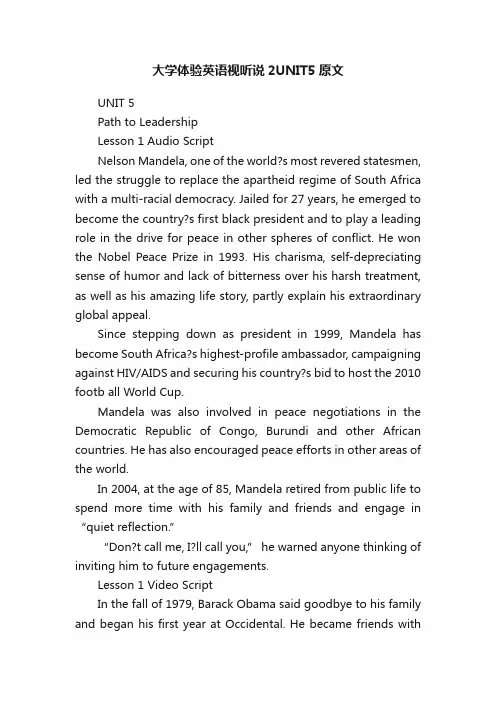
大学体验英语视听说2UNIT5原文UNIT 5Path to LeadershipLesson 1 Audio ScriptNelson Mandela, one of the world?s most revered statesmen, led the struggle to replace the apartheid regime of South Africa with a multi-racial democracy. Jailed for 27 years, he emerged to become the country?s first black president and to play a leading role in the drive for peace in other spheres of conflict. He won the Nobel Peace Prize in 1993. His charisma, self-depreciating sense of humor and lack of bitterness over his harsh treatment, as well as his amazing life story, partly explain his extraordinary global appeal.Since stepping down as president in 1999, Mandela has become South Africa?s highest-profile ambassador, campaigning against HIV/AIDS and securing his country?s bid to host the 2010 footb all World Cup.Mandela was also involved in peace negotiations in the Democratic Republic of Congo, Burundi and other African countries. He has also encouraged peace efforts in other areas of the world.In 2004, at the age of 85, Mandela retired from public life to spend more time with his family and friends and engage in “quiet reflection.”“Don?t call me, I?ll call you,” he warned anyone thinking of inviting him to future engagements.Lesson 1 Video ScriptIn the fall of 1979, Barack Obama said goodbye to his family and began his first year at Occidental. He became friends withseveral black students, but no matter how hard he tried he just didn?t see himself as one of them.“It was very important for him to figure out what it meant to be a part of the black community. He was an American. He was a black American. And he, I think, needed to figure out what that was.”At the end of his sophomore year, Obama transferred to Columbia University in New York. He hoped to find his place in the cit y?s diverse population. Once there, Obama took long walks through New York?s ethnic neighborhoods. Obama became more disciplined. He ran three miles a day and studied harder. He also turned to books for answers about race and social injustice.“He basically wasn?t going out much. He was reading Nietzsche, and Gandhi, and absorbing just everything he could.”His work gained momentum, and he stopped using drugs.“He was ready for a battle, and he was growing up. He had to figure out what he was going todo for the rest of his life.”ScriptObama stayed focused on his studies and began to think about life after college. He eventually decided to pursue a career as a community organizer, where he hoped to confront the kind of racism and poverty that had troubled him for most of his life. After graduation, he took a job with a Chicago-based group called DevelopingCommunities Project. He moved to the city?s South Sideand began working to improve the conditions in a public housing project called Alt-Geld Gardens.Over the next few years, Obama succeeded at variousprojects, including school reform, hazardous waste cleanup and establishing a job training center.“It became clear to him that so muc h of the struggle of people who had been left behindinvolved laws and that, if he was to be an advocate, that he needed to be credentialed in the law.”Obama set his sights high and applied to Harvard Law School. He was accepted and took outhefty student loans to pay his tuition.Lesson 2 Audio ScriptThe following things may help you make your goals and dreams become a reality. Set clear long-term and short-term goals. Make sure that you?re motivated by and committed to the goals you?ve set for yourself so that you?re willing to take the necessary steps to reach those goals successfully.Stay focused on your goals once you?ve set them. It?s easy to stray off course, but by keeping your goals in sight, you can work towards them every day.Overcome obstacles. No one ever said that reaching your goals and obtaining success was easy.If you truly desire success in life, you must be willing to overcome obstacles on the way to reaching your goals and dreams.Approach your goals and dreams with a positive attitude. Having a negative attitude and thinkin g that you can?t accomplish your goals and be successful in life will only slow you down. Stay positive even if the road gets tough, and you?ll be that much closer to achieving success.Be flexible and creative. Things may not always turn out the way you?d hoped or planned, but by being flexible and creative,you?ll be able to think of new, more efficient ways to reach your goals.Lesson 2 Video Script“Well, thank you for that kind introduction.”Everybody knows his accomplishments: founder of Microsoft, creator of Windows, world?s richest man for most of his career and now Co-Chair of the world?s largest charitable foundation. What was Bill Gates like before he was Bill Gates In exclusive interviews provided to us by Microsoft, family members and Microsoft colleagues provide their own memories of what Bill Gates was like when he was young and what life has been like with him in Microsoft. Bill Gates was born Oct. 28th, 1955 in Seattle to a very prominent family. His father was a lawyer. His mother was very engaged in public matters. And from the beginning of his life, he was really intense and displayed an unusual intelligence. By the time he was in sixth grade, he was already involved in technology and computing and doing things that would be very unusual for most children. He was a very unusual child, very intense, very intelligent from the beginning. And those qualities really help define thecompany that he would later found.“We have a very competitive family, an d I think the competivene ss started very young with card games. My brother likes to think of himself as sort of the best at everything, and it turns out he is a pretty darn good pickleball player.”Script“The family is going somewhere together and the ot her four of us upstairs, getting, gonna get into the car. And …Bill where are you, what are you doing?? and all that sort of thing. And on one occasion in particular he hollered back up. Hesaid, …Mother I?m thinking. Don?t you ever think?? And Mary and I looked at each other an d we sort of, …Well I wonder if we ever do think??”“ My parents were great about sharing their experiences, my Dad talking about different lawsuits he was in, my Mom talking about some of the challenges in the board and non-profit work she was doing. And so from an early age, my sisters and I felt like business problems were something that we could understand and think about. And from an early age, I got a chance to think about well, what do I want to choose to do? And that got me reading magazines, some books, Fortune magazine. And when the computer came along, the idea of starting a business around it was a fairly natural thing."Eager to make his mark on the emerging personal computer industry, which was still tiny, Bill Gates dropped out of Harvard in 1975 after only three semesters and founded Microsoft with his childhood friend Paul Allen.Home ListeningA person?s motivation is combination of desire and energy directed at achievinga goal. 1)influencing someone?s motivation means getting him or her to want to do what you know must be done.People can be motivated by beliefs, values, interests, fear,2)worthy causes, and other such forces. Some of these forces are3) internal, such as needs, interests, and beliefs. Others are external, such as danger, the environment, or 4)pressure from a loved one. There is no simple formula for motivation —you must keep an open viewpoint on human nature. There is a 5)complex array of forces steering the direction of each person, and these forces cannot always be seen or studied. Also, if the same forcesare steering two different people, each one will act differently. Knowing that different people react to different needs will 6) guide your decisions and actions in certain situations.As a leader you have the power to influence motivation. You should allow the needs of your people to coincide with the needs of your organization. Nearlyall people are influenced by the need for job 7)security promotion, raises, and approval from their peers and leaders. Internal forces such as values, morals and Home Listening ethics also influence them. Likewise, the organization needs good people in a wide variety of jobs. Ensure that your people are trained, 8) encouraged, and provided the opportunity to grow. Ensure that the way you conduct business has the same values, morals and ethical principles that you seek in your people. 9)If you conduct business in a dishonest manner, your people will be dishonest to you You should alsoreward good behavior. 10) Although a certificate, letter or a thank you may seem small, they can be powerful motivators. The reward should be specific and prompt. Do not say, “for doing a good job.” Cite the specific action that made you believe it was a good job. In addition, help your people who are good. We all make mistakes or need help to achieve a particular goal.。
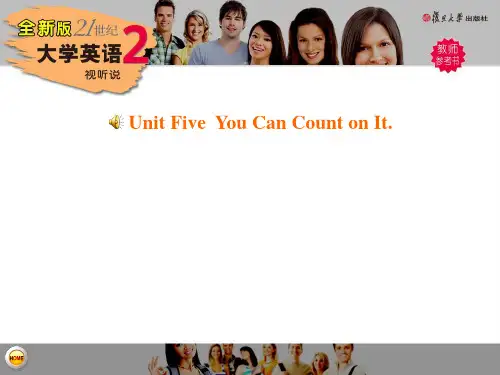
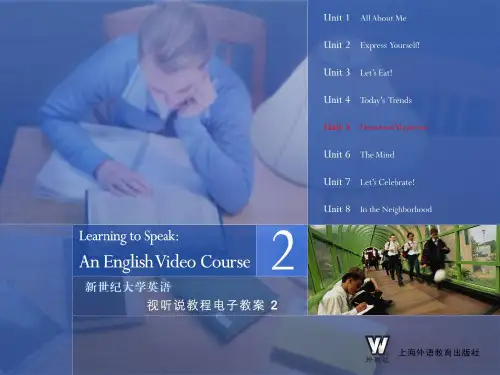
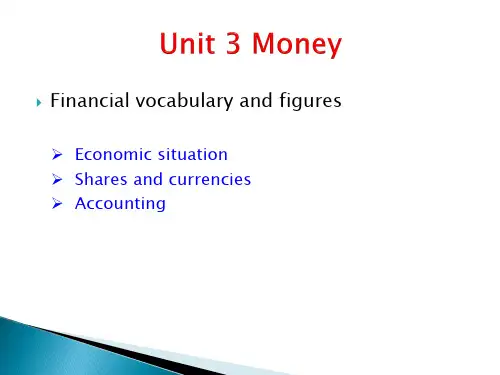

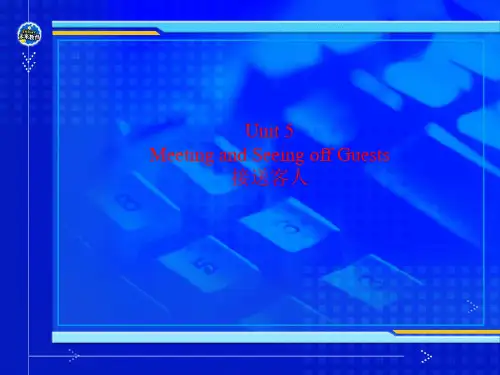

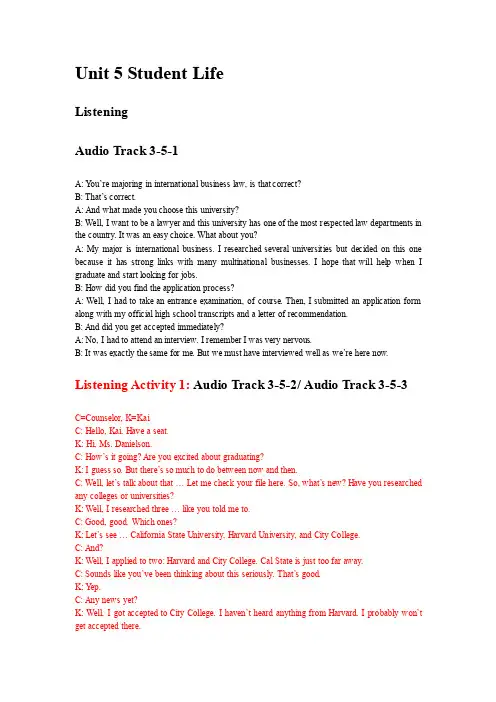
Unit 5 Student LifeListeningAudio Track 3-5-1A: Y ou’re majoring in international business law, is that correct?B: That’s correct.A: And what made you choose this university?B: Well, I want to be a lawyer and this university has one of the most respected law departments in the country. It was an easy choice. What about you?A: My major is international business. I researched several universities but decided on this one because it has strong links with many multinational businesses. I hope that will help when I graduate and start looking for jobs.B: How did you find the application process?A: Well, I had to take an entrance examination, of course. Then, I submitted an application form along with my official high school transcripts and a letter of recommendation.B: And did you get accepted immediately?A: No, I had to attend an interview. I remember I was very nervous.B: It was exactly the same for me. But we must have interviewed well as we’re here now. Listening Activity 1: Audio Track 3-5-2/Audio Track 3-5-3C=Counselor, K=KaiC: Hello, Kai. Have a seat.K: Hi, Ms. Danielson.C: How’s it going? Are you excited about graduating?K: I guess so. But there’s so much to do between now and then.C: Well, let’s talk about that … Let me check your file here. So, what’s new? Have you researched any colleges or universities?K: Well, I researched three … like you told me to.C: Good, good. Which ones?K: Let’s see … California State University, Harvard University, and City College.C: And?K: Well, I applied to two: Harvard and City College. Cal State is just too far away.C: Sounds like you’ve been thinking about this seriously. That’s good.K: Y ep.C: Any news yet?K: Well, I got accepted to City College. I haven’t heard anything from Harvard. I probably won’t get accepted there.C: Why do you say that?K: Y ou know … it’s so competitive. I don’t think my grades are good enough.C: Well, let’s wait and see.K: I’ll probably go to City College. My brother went there. I visited the campus and I like it.Listening Activity 2: Audio Track 3-5-4/Audio Track 3-5-5Lucia: And finally today, we have a report about graduating seniors. Jason Kim is standing by. …Jason, are you there?Jason: Hi, Lucia.Lucia: The Metro Times newspaper asked college seniors, “What are you going to do after you graduate?”Jason: That’s right, Lucia. The students gave some surprising answers, too.Lucia: For example …?Jason: Well, more than 50 percent of the students say that they aren’t going to start a new job right away.Lucia: Well, what are their future plans?Jason: Let’s ask some of them. … Excuse me.Mizuki: Y es?Jason: I’m Jason Kim from XCA-TV. Y our name, please?Mizuki: Mizuki.Jason: And what are you studying?Mizuki: Art.Jason: OK, Mizuki, what are you going to do after you graduate?Mizuki: I don’t know. I’ll probably just chill out for a while.Jason: Chill out?Mizuki: Y ou know, relax.Jason: OK, Mizuki. Thanks for your comments. … Hello, I’m Jason Kim and we’re doing a live report. What’s your name and major?Ro bert: My name is Robert and I’m studying law.Jason: What are you going to do after you graduate?Robert: I don’t know … maybe I’ll take a long trip.Jason: What about a job?Robert: Work? Maybe one of these days. But first I’d like to take a trip.Jason: Thank you, Robert, and good luck. Well, that’s all for now. This has been Jason Kim, with my report on college seniors. Now, back to you, Lucia …Listening Activity 3: Audio Track 3-5-61. Hi, I’m Eduardo. I got accepted to college recently. Since the s chool is just in my neighborhood, I’m going to live at home. I will not apply for a scholarship because it is too hard to get it. I think I’ll be able to support myself by working part-time. In my view, money is veryimportant though it is not everything.So most probably I’ll study business. I hope I can make it big after graduation.2. I’m Jill. I’m going to join a sorority. I want to make more friends of the same sex. I think that women should be united and should always help each other. I’m going to d o volunteer work in my spare time to help those elderly ladies in the community with their errands. I’m not going to a large university since I can’t afford it.3. I’m Max and this is Sara. We love each other. We’re not going to live in student housing. We plan to live in a medium-size apartment not far away from the university. We’re going to study together and work part-time.Audio Track 3-5-7I’m Mary and I’m twenty. I’m studying Lifelong Education at the University of Tokyo. I think it’s important f or everyone to keep learning all their lives. That’s why I chose to major in Lifelong Education. Personally, I’m planning to further my education in an American university after graduation. So right now, I’m taking an English class. I want to improve my English. I’m working part-time at a video store because I need to save money for my studies abroad.I have a boyfriend and he wants to go and study in the United States too. We have similar interests and personalities. I’m going to get married and live in a house by the ocean. Sooner or later, I’ll have my own children. I will most probably stay at home to be a full-time mother before my children are sixteen years old. To witness their growth would be the most valuable thing in my life.Listening Activity 4: Audio Track 3-5-8/Audio Track 3-5-9New graduates talk about the futureAfter the City College graduation ceremony yesterday, we talked to three students about their plans and their dreams.Here is what Jameela Brown had to say about her future:I worked so hard for four years. I need a break now! I majored in biology and chemistry, and I hada summer job in a day care center. I’m going to take a year off before I start medical school. My plan is to travel and do volunteer work in West Africa. I’ll be a doctor someday but I’m not sure what kind of doctor I’ll be.Jennie Min talked about her plans:I studied business, and it was easy for me to find a job. Next month I’ll move to New Y ork to start work at Giant Corporation. But I don’t really want to spend my whole life working for a company.I hope I can start my own business. Maybe something with food. I love cooking! In college, I cooked dinner for my roommates every night.Shane Peterson told us about his big dream:Wow! Four years really went fast. I c an’t believe it’s graduation day! My major was computer science, but I spent all my free time playing music. I played guitar in two different bands. I also play electronic music, using computers. I have job interviews with three software companies nextwee k. I’m not worried about getting a job, but I really want to play music, too. That’s my biggest dream.Listening Activity 5: Audio Track 3-5-10/Audio Track 3-5-11Interviewer: We now have a winner! Stephanie Lee from V ancouver, Canada answered our ques tions and won the top prize: She will be our youth travel reporter in Europe! She’s going to travel for three months and write about her experiences for our website. Do you have any international travel experience?Stephanie: Y es, I do. Two years ago, I spent the summer in Hong Kong, China. I stayed with my grandmother and worked in the family business. I also visited Africa last year.Interviewer: What do your travel experiences tell us about you?Stephanie: I stayed in Hong Kong for about two months. I think that shows I can stay away from home for a long time. I don’t get homesick at all. In Africa, I went to Tanzania. The highlight was climbing Mount Kilimanjaro. It’s the highest mountain in Africa. The climb was very hard. Two people turned back before they reached the top. I made it all the way! Once I start something, I never give up.Interviewer: This job gives you a digital camera and pays your travel expenses. It doesn’t pay a salary. How will you get your spending money?Stephanie: I had a part-time job in a restaurant. I had worked there for two years. Fortunately, I saved a lot of money, so I won’t have to worry about money for my trip to Europe. Interviewer: Why should we choose you?Stephanie: Because I love to travel! I’m a hard worker a nd will have no trouble filing reports on time — and I have a lot of energy!Speaking & CommunicationAudio Track 3-5-121. I’m gonna apply to three colleges.2. He’s gonna clean the house next week.3. We’re gonna study together for the big exam.4. T hey’re not gonna finish in time.Audio Track 3-5-131. I’m not gonna meet them before 3:00.2. We’re not gonna take a vacation this summer.3. She’s gonna call us tomorrow.4. He’s not gonna attend Harvard University.Audio Track 3-5-14Hans: Hi, Tom. What’s new?Tom: Well, I’m going to start at a new high school this fall.Hans: Which one?Tom: Essex Academy. It’s a boarding school. It’s a five-hour drive from my parents’ house. Hans: Does boarding school mean you live there? On campus?Tom: Exactly.Hans: That sounds awesome!Tom: Y eah. I think it’s going to be cool.Audio Track 3-5-15A: I study hard and get good grades. I’m usually on the honor roll.B: What does honor roll mean?A: It’s a special list for students with very good grades.B: Oh, I see. Well, I like study hall. I can do my homework and prepare for exams.A: I don't understand. What do you mean by study hall?B: It’s a time that is reserved for quiet study.Audio Track 3-5-16A: Are you free at noon tomorrow?B: No, I’m not. I’m goi ng to eat lunch with my friends then. How about 2:00 p.m.?A: Sorry, but that doesn’t suit me. I’m going to get a flu shot at 2:15.B: Oh, really?A: Y eah. The doctor strongly advised me to do it.B: Then how about 7:30 p.m.?A: That’s all right for me. Se e you then.Video CourseVideo Track 3-5-1Agnes: After I finish my Ph.D. I would like to go back to Senegal and start my own business in agriculture.Brad: After I graduate I will move to Washington, D.C., to work for National Geographic. Calum: After I graduate I’d like to have a good job that pays a lot of money, and to travel and see the world.Dave: After I graduate from college I will go to graduate school and I’m going to study art. Alex: After graduation I plan to find a good job. I also plan to start a family and buy a house. Julianna: I want to start my own business, an import-export business.Alejandra: My students work very hard and get good grades to get into university.After finishing their degrees in the United States they will go home and either work with their families or open a business.Video Track 3-5-2Dave: Five years from now I will still be studying and I don’t know where I’m going to live. Calvin: I’d like to become a lawyer and I’d like to specialize in cyberlaw. I think c yberlaw will be pretty big within five, six years or so.Woo Sung: I’ll probably be married. I want about three kids, a dog, my own house, and a job that I enjoy. And you know most of all I just want to be … just I guess … enjoy my life.Video Track 3-5-3Mike: Do you think he was accepted?Sun-hee: I don’t know …Mike: Any news from Harvard?Sun-hee: He was rejected. He also applied to the University of Southern California, and they didn’t accept him either. It’s too bad. He studied so hard in film schoo l. And he got really good grades …Mike: I know. And he researched all those schools and applied for all those scholarships … I hope he gets in. Hey, do you know what he’s going to do if he doesn’t get into grad school?Sun-hee: No, what?Mike: He’s going to hit the road.Sun-hee: I don’t understand. What do you mean?Mike: He’s going to buy a nice camera and travel around Europe taking photos for his brother’s website.Sun-hee: Now that would be an experience, but it’ll be sad if he goes.Mike: He’ll get in … I just know it!Takeshi: (enters front door) Hi!Sun-hee: Takeshi!Mike: There’s a letter for you from the Columbia graduate school.Sun-hee: (takes letter from Mike) Uh, uh, uh! Now let’s think about this for a moment. What are you going to do if you aren’t accepted?Takeshi: Well, like I said, I’m going to travel around Europe for a while. And then I’ll apply to graduate school in a few years …and I will get in!Mike: (takes letter from Sun-hee) What will you do if you are accepted?Takeshi: Oh, that’s easy. I’m going to become a film director.Mike: (gives letter to Takeshi) All right then … here. (waits for Takeshi to open letter) Well! What are you waiting for? Open it!Takeshi: Here goes … (opens letter)Sun-hee: Well?Mike: Were you accepted?Tak eshi: I’m going to grad school!Video Track 3-5-4Mike: Do you think he was accepted?Sun-hee: I don’t know …Mike: Any news from Harvard?Sun-hee: He was rejected. He also applied to the University of Southern California, and they didn’t accept him either. It’s too bad. He studied so hard in film school. And he got really good grades …Mike: I know. And he researched all those schools and applied for all those scholarships … I hope he gets in. Hey, do you know what he’s going to do if he doesn’t get in to grad school?Sun-hee: No, what?Video Track 3-5-5Mike: He’s going to hit the road.Sun-hee: I don’t understand. What do you mean?Mike: He’s going to buy a nice camera and travel around Europe taking photos for his brother’s website.Sun-hee: Now that would be an experience, but it’ll be sad if he goes.Mike: He’ll get in … I just know it!Takeshi: (enters front door) Hi!Sun-hee: Takeshi!Mike: There’s a letter for you from the Columbia graduate school.Video Track 3-5-6Sun-hee: (takes lett er from Mike) Uh, uh, uh! Now let’s think about this for a moment. What are you going to do if you aren’t accepted?Takeshi: Well, like I said, I’m going to travel around Europe for a while. And then I’ll apply to graduate school in a few years … and I wil l get in!Mike: (takes letter from Sun-hee) What will you do if you are accepted?Takeshi: Oh, that’s easy. I’m going to become a film director.Mike: (gives letter to Takeshi) All right then … here. (waits for Takeshi to open letter) Well! What are you waiting for? Open it!Takeshi: Here goes … (opens letter)Sun-hee: Well?Mike: Were you accepted?Takeshi: I’m going to grad school!Audio Track 3-5-17Takeshi got a letter from the Columbia Graduate School. While Sun-hee and Mike were waiting for him to c ome home, they talked about Takeshi’s plans for grad school. Takeshi had applied to several graduate programs, but two schools had already rejected him! Mike said that Takeshi was going to hit the road if he didn’t get accepted. When Takeshi got home, he e xplained that if he didn’t get accepted he was going to travel for a while and then he would apply to graduate school again. He also said that if he was accepted, he was going to become a film director. Takeshi finally opened the letter — and it was good news! Takeshi was going to go to grad school at Columbia!。
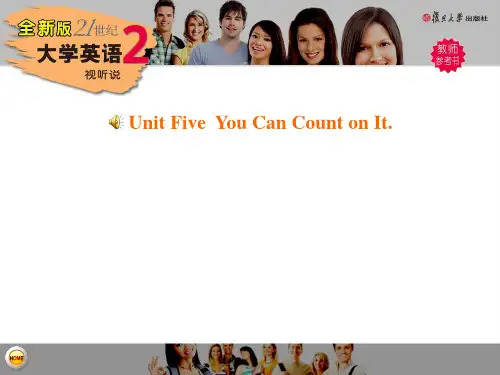

商务英语视听说答案 HEN system office room 【HEN16H-HENS2AHENS8Q8-HENH1688】扩展商务英语视听说1-8单元答案Unit 1Part I Listening and SpeakingTask 1Q1.I am graduating in June from ABC University and my major is hotel management. I am an outgoing, energetic person. I enjoy teamwork very much. As part of my degree program, I needed to finish different projects with my teammates. I possess excellent interpersonal skills and a very positive attitude. My career aspiration is to become a successful hotelier. During my internship at the Grand Hyatt, I worked as a receptionist. My duties included offering friendly and efficientcheck-in and check-out service to guests, answering phone calls, taking and passing on messages to guests, I find that if I can make the guests happy, I will be very happy, too.Q2.I received honors in several school-wide English and computer contests. I enjoy working with people from different backgrounds. I am good at communicating, organizing and coordinating. If something blocks my path, I will look for a solution.I never give up easily.Sometimes I receive comments that I need to improve in the area of filing. I am now trying to improve by learning from others. Q3.Interest and career development are two of my criteria in choosing a job. Interest is the best motivation. I love the hotel business, so I will definitely devote myself to it. Moreover, high job satisfaction can be attained when the job is what I am interested in.Career development is very important for me when choosing a job. From what I know, Shangri-La provides equal career advancement for all staff. The job rotation plan and individually tailored training program are really exciting and helpful for young people like me.Task 2Is that your wife, Mr. Carter She is so beautiful.Avoid asking interviewer personal questions or making personal comments. Could you tell me how much the new job pays?The interviewer might infer from these questions that you are only interested in your own needs and not those of their company. Wait until the employer raises these subjects to discuss them.What about the paid holidays, insurance, and things like that?How much time will it take for me to be promoted here?But in which cities do you have your branches And where is your company basedIt is also unwise to ask about things you should have already known. You are only telling the interviewer that you haven't done your homework.Part II Language FocusName: CaiNingPersonality: serious-minded; calm; humorous; easy-goingStrengths: the ability to work with all types of peopleWeakness: perfectionist; impatientWork experience: six years’ financial industry experience with severalcompanies; two years’ experience in an investment bankQualification: graduated from Peking University in 2001 majoring inaccounting; fluent English; bookkeepingand accounting proficiency inEnglish.Reasons for leaving last job: want to find a job that is challenging.Questions about the job: Would I be able to work abroad in one of youroverseas branches?Part III Viewing and SpeakingVideo 1Reasons for joining the It is one of the leading international consultant corporationscompany which came to China after China entered in thiscompany would give him the best chance to use what he haslearned at university.Relevant work experience He was involved in a factory restoration in Nanjing. Questions Are there any opportunities for Chinese employees to betransferred to the head office in New York or other branchoffices around the world?Result of the interview Chen Bo will be notified of the final decision by Friday.Video 21. F T F F T2. 1) Sales Manager2) Five3) Brand Manager4) biscuits5) Business Administration6) oral EnglishIV Case AnalysisHint:She is not likely to get the job because she did poorly in the job interview.Things went wrong:1. Use filler words (“you know”) too many times.2. Bad-mouth former employer.3. Inappropriate answers to interviewer’s questions, eg, “I would rather like to establish my own company”4. Ask inappropriate questions, eg. “Can I take time off for vacation”5. Self-conceit—“I have no weakness”.6. Too much emphasis on travel.Scripts Unit 2Part I Listening and SpeakingTask 11) I haven’t seen you for years.2) What do you do now?3) I’m in the Research and Development Department.4) I knew you’d do something very challenging and creative.5) I sometimes stay in the office after work to deal with unfinished tasks.6) I am still the accountant of that cosmetics company.Task 21) personnel management2) developing markets3) planning4) execution5) sales targets6) team performance7) customer base8)customer satisfaction9)selecting, developing and managing10)cost-effective11)on time12)of good quality13) human and material resources14)training needs15)continuous improvementPart II Viewing and SpeakingVideo 1Clinton: financial accountsLucy White: data processingAdaBalck: management accounts2. Administration; Marketing; Engineering; Project Preparation; AccountingVideo 21. self-employed entrepreneur, buyer, Line Supervisor, Advertising Executive, Public Relations Manager2.NamesJeromethings Likes Dislikes making a lot more money; having lots of independence in doing feeling tired sometimesRobin having been to a lot of places too much traveling; having very little time tospend with his familyColin good salary and benefits noisy work environment; seldom having theopportunity to go outFrank new challenges; a lot of experienceJanet meeting a lot of new & interesting people often having dinner parties in the evening; having little time with her family and babyUnit 3Part I Warm-up1) ensure smooth business communication2) the purpose of your call3) all the documents you’ll need4) schedule a specific time5) all distractions.6) confirm that you have understood each point.7) interruptions.8) strong accent.9) you sound polite and agreeable.10) the optional choice method,11) lengthy calls.12) smile while you are talking.Part II Listening and SpeakingTask 1F F TT F T F FTask 2 Leaving a messageMessage Note To: Louise Paulson From: Paul Jackson Phone: 979-326-8965 Message: Ring back to him about the order they placed last Friday. They have to make some changes to the order. It’s urgent. Taken by: RoyPart III Viewing & SpeakingVideo 11. F F T T F2. Message 1) Will you tell him that we’ve just received your sample of the new assembly coffee table and are quite happy with it?Message 2) Please tell Mr. Matthews we’re quite happy with the quality and design of the table, but the price is too high. We need some negotiation on it.Message 3) Please inform Mr. Matthews that I won’t be able to get to your company early on Saturday because of the rail strike. I probably won’t arrive until that afternoon.Video 21.1) A 2)C2.1)“Hold on, please. I’ll connect you.”2)“I’m afraid you’ve dialed the wrong extension.”3)“Oh, sorry to have interrupted you. Can you give me Henry Miller’s extension, please”4)“I’m very sorry, I didn’t notice that. I’ll put you through ri ght now. Please wait a minute.”5)“It’s me again—Ms. Mandel. I’m still having trouble getting through to Henry Miller Can you help” 3) C 4) C 5) B 6) C6)“Oh, I’m terribly sorry for the trouble.”Unit4Task 11Formal*Good afternoon, I’d like to call the meeting to order.* First of all, let’s discuss?2Informal*OK, everyone is here?*So, why don’t we start with?3Informal* Right, you know why we are here.* Maybe we should do it like this?4Formal*Welcome to BCG, and to what I am sure will be the beginning of a major new alliance.* Today our purpose is to?5Informal*Right, let’s get down to business?* I suggest we deal with that?6Formal*Well, gentleman, it’s a pleasure to be here today?*I’d like to start with?Task 21) Arrive at the meeting ahead of schedule.2) Consider using a tape recorder.3) Use a consistent format.4) Follow the agenda.5) Be concise.6) List specific outcomes.7) After the meeting, write a meeting report from your notes. Part II Viewing & SpeakingVideo 1F FF T FVideo 21) To figure out the reason for the sales drop and the actions to be taken.2) The salespeople are not very motivated.3) No, because the sales quotas are pretty high.4) He proposes to lower the quotas.Unit 5Part I Listening and SpeakingTask 1C B B C ATask 21)daily routine in the office2)whether the visitor has an appointment or not3)greet the visitor4)the visitor’s name, title and position5)apologize and make some suggestions6)express regret and explain why7)date, time, name and the firm the visitor works for.8)considerate and warm9)keep the visitor fully informed of the situation.Part II Viewing and SpeakingVideo 11)George is travelling on business.2)He will stay for about a week.3)He has been invited to attend the trade fair by his business associates.4) His laptop computer is in the bag. It’s duty-free.5) No, good for personal use rather than commercial use are not subject to duty, and they are within the limit.Video 22. TUnit 6Part I Listening and SpeakingTask 11. we are hiring for2. business software and consulting services3. 4,0004. large corporations5. 90 million dollars6. pretty fast7. 298. a large project for a bankTask 2Company Profile1) Monica Li2) Manager of the PR Department of Oracle China3) enterprise software company in the world the first4) global software giant in China5) 19776) California7) 42,0008) 11 billion dollars9) 1989; set up Beijing Oracle Software Systems in10) 1991.11) Chengdu.12) education and support services.Part II Viewing and SpeakingVideo 1B A D E CVideo 2The things that Joan Copper does badly1. She doesn`t consider the audience2. She doesn`thave clear objectives3. Her presentation isn`t well-prepared4. There isn`t a clear structure (beginning, body, end)5. she doesn`t speak clearly6. she doesn`t speak at the right speed7. she doesn`t maintain eye contact with the audience8. she doesn`t appear confident and positive9. the visual aids aren`t clear and helpful10. she doesn`t use the equipment professionallyUnit 7Part I Listening and SpeakingTask 1120CM 130CM43KG 54KG 6KM/Hmovement controllerwill controlTask 2Small and elegantEasy to set up: all you need is a touch-tone phone ;as easy to use as making a normal telephone callFull-color motion video; adjustable picture setting; good audio quality; preview mode; privacy modeOn a special offerPart II Viewing and SpeakingTask 1service guaranteeTask 21.$2200 years for three years,$150/year after three years three weeks 24 hoursUnit 8Part I Listening and SpeakingTask 1flat up reached a peak down dropped Task 2The growth trend more than 37% the persistent high price RMB48 million accounted for % domestic routes RMB16869 million Part III Viewing and SpeakingVideo 1Tasksignificantlyby 50%to risefastVideo 2Task 1A B D F GTask 2turnoveroutput of washing machines share of refrigerators。
新标准大学英语视听说听力原文(5)Tricia :Well, it’s true, yes.Karen :I agree with Rick.Presenter :So, next question …Unit 5 WarListening inPassage1There are many war novels but the novel I’m going to talk about today is unusual because it’swar seen through the eyes of a child. The “eyes” are those of J G Ballard, one of Britain’s most respected novelists.Let’s begin with some information about Ballard. He was born in 1930, in Shanghai, where his father was a businessman, and he was only 11 years old when the city was occupied during World War II. Ballard and his family were placed in a prison camp and he has said that his experiences there affected him so deeply that it was 40 years before he felt able to write about them. “Twenty years to forget and 20 years to remember.”The result of Ballard’s experiences was a semi-autobiographical novel called Empire of the Sun, published in 1984. It quickly became a success and in 1987 it was made into a movie by Hollywood director, Steven Spielberg.Let’s move on to the novel itself. Empire of the Sun tells the story of how a young boy, Jim Graham, survives the Japanese occupation. Interestingly, Jim is J G Ballard’s first name and his second name is Graham.Also, Jim is the same age as Ballard –11 –when the occupation begins. At the start of the story, Jim is living with his parents in a wealthy part of Shanghai. When the invasion begins,many of Shanghai’s inhabitants flee from the city and Jim’s parents do the same. But theboy becomes separated from them and finds himself all alone. He goes back to their empty home and lives alone there. Inevitably, he’s found and then he’s sent to a prison camp.It’s a terrible four years, but the boy somehow surviv es. He steals food, finds ways of getting in and out of the camp, and is befriended by some Americans and a Japanese boy.Is there a happy ending? Yes and no. Jim sees many people die; his Japanese friend is killed by the Americans. But at the end of the war, he gets back to Shanghai and is reunited with his parents.Jim’s experiences are terrible, as a child who discovers the depths of human cruelty. But he learnsalso about the strength and courage that is possible, even in these circumstances. Both the great power and the truth of the novel come from the fact that it’s based on the author’s own experiences. The general opinion of critics is that Empire of the Sun is one of the best war novels ever written – so read it, it’s worth it.Passage2HostOn Women’s World today, we look at women’s role in the Second World War and the important part they played in it. In the First World War, women had worked in factories and as nurses, both at home and at the front. In the Second World War, women were even more essential to the war effort. Doris Watts was just 18 when the war began and Mavis Grey was only 20.HostDo you remember how you felt, Doris, the day the war wasdeclared?DorisOh yes … of course I do. I felt frightened of course, but we had known it would happen. The first thing, more than anything I think, that I felt was … was that I wanted to do something! You know, do something useful, so I joined the Land Girls.HostAh, yes, the Women’s Land Army. That was an organization started in the First World War. Women worked in agriculture as the men were away fighting. Did you enjoy the experience?Sporting life Unit 6DorisNot really. It was very hard work, very physical. You never saw anybody except the officer coming to inspect your work. So when I heard about the WAAF I signed up.HostThat’s the Women’s Auxiliary Air Force. WAAF, for short. So why the WAAF?DorisI’d always thought planes were very exciting. And it’s silly but I liked the light blue uniforms.HostThat’s a good enough reason! Now, Mavi s, you were in the WAAF at the same time as Doris. Can you tell us more about it?MavisYes. Organizations like the WAAF were a way for women to join the armed forces, since they weren’t allowed to fight. Instead, the army, the navy and the air force all had support services, which women could join.HostAnd Doris. What kind of things did you have to do?Doris Oh, well, a lot of different things. I worked in transport and catering. We were very young but we were given a lot of responsibility.Host大学英语。
Watch Part 1 of the video clip and check the true statements according to the clip.1. The first speaker talks about old and new ways of finding someone to love.2. He says that the Internet has completely changed the world of dating.3. Four young people interviewed have tried Internet dating.4. Carol and the younger woman are friends.5. The younger woman is going to register on an Internet dating site.6. To get started with Internet dating, there are five steps.Watch Part 1 again and complete the sentences.1.Your answer Correct answerat work at work2.America.Your answer Correct answer150 million150 million / one hundred and fiftymillion3.Your answer Correct answermet anyone yet met anyone yet4.Your answer Correct answercreat your profile create your profile5.want to hook up with.Your answer Correct answerin you area in your area6.Your answer Correct answernice short letter nice short letter7.Your answer Correct answerinterested in them interested in themWatch Part 2 and choose the best way to complete the sentences.1. Carol feels that the first candidate ____.(a) sounds interesting(b) doesn't sound interesting(c) is not interested in a relationship(d) would want to go travelling all the time2. Carol's daughter rejects the third candidate because he ____.(a) broke up with someone recently(b) has been in a long relationship(c) is still in love with someone else(d) is desperate to meet a kind woman3. Doctor Ski ____.(a) likes climbing(b) is looking for someone a bit different(c) likes classical music(d) likes jazz and cycling and skiing4. Uncle Bunny ____.(a) loves music(b) is 28(c) loves the outdoors(d) is a lawyer5. Sail Away ____.(a) is attractive(b) is kind(c) likes to travel(d) is 521. Why did Amy go to the French Alps?(a) Because she went there to visit her friend who's ill.(b) Because she went there on holiday.(c) Because she went there to go mountain climbing.(d) Because she went there to have a blind date with David.2. Why did she go climbing?(a) Because someone invited her to go climbing.(b) Because David invited her to go climbing.(c) Because she went on an adventure trip.(d) Because she always wanted to go mountain climbing.3. Why was she terrified?(a) Because the mountain was higher than she had expected.(b) Because the mountain was covered with snow.(c) Because the mountain was vertical.(d) Because the mountain was slippery.4. What did David do to help her?(a) He told her funny stories.(b) He encouraged her.(c) He helped her climb.(d) He guided her.5. When did they fall in love?(a) When they start climbing.(b) When they reached the summit.(c) When they climbed back down the mountain.(d) When David came over to talk to Amy.6. What happened at the summit?(a) They had a long talk with each other.(b) Other people came over to encourage Amy.(c) Amy collapsed and couldn't stand up.(d) David invited Amy to have some pizzas.7. What did Amy and David do after the climb?(a) They had some pizzas.(b) They went to a village.(c) They went to a party with the others.(d) They went to visit Amy's sick friend.8. What happened after that?(a) They hadn't seen each other for six months.(b) They went on a holiday to other mountains.(c) They became good friends.(d) They got married later.Listen to Passage 2 and check the topics mentioned.1. being nervous2. uploading photos3. video dating4. trusting your instincts5. exchanging emails6. giving out personal information7. paying for online dating8. talking on the phone9. your first meeting10. honestyYour answerlieYour answerrecent photohappy to do so.Your answer Suggested answerpersonal information personal informationYour answeragree to meetUnit test/view/99e02d59f01dc281e53af047.html。
体验商务英语视听说答案【篇一:体验商务英语4 综合教程】lass=txt>一.课程基本信息课程编号:0142524课程类别:选修总学时:36课程简介:商务英语课程作为翻译专业的一门专业先选课程,主要目标是培养学生掌握国际贸易的基础知识、基本技能,能独立从事一般的对外贸易业务工作。
具备听说读写译的基本技能,语音语调正确、语法概念清楚,能用英语较熟练地从事外事接待、外贸业务洽谈的口、笔译工作。
在培养学生英语语言能力的同时让学生了解和熟悉各种商务情景和商务活动,掌握相关的商务及商务文化知识,并使他们能够把所学的知识运用到各种商务活动中。
二.教材简介教材名称:体验商务英语综合教程4教材编者:david cotton;david falvey; simon kent;《体验商务英语》改编组出版社:高等教育出版社教材情况简介:本教材话题紧跟国际经济发展形势,循序渐进地训练学生用英语进行调研分析、归纳总结和使用正确语体作书面或口头表述的能力。
既可以帮助在校生了解真实的商务环境和话题,学习地道的商务英语;也可以帮助从事各种经济活动的商务人员通过语言技能综合训,较快地提高语言能力。
将国际商务活动引入课堂,体验真实的商务世界。
角色扮演和案例学习将体验式学习引向深入,教学设计严谨,为体验式学习打好基础。
教学资源丰富,为体验式教学提供有力支持。
三.课程教学内容教学重点与难点1. 重点:掌握各种商务活动情景对话中的语言要点及专业词汇2. 难点:由于缺乏实战经验,学生难以理解不断涌现的商务方面的新知识和商务活动的实战环节。
教学内容、目标与学时分配教学内容教学目标课时分配 unit1communication 掌握4unit2international marketing 掌握4 unit3building relationships掌握4 unit 4 success掌握4 unit 5 job satisfaction掌握4 unit6 risk了解0 unit7 e-commerce掌握4 revision unit aunit 8team building了解 0 unit 9raising finance 了解 0 unit 10 customer service 了解 0 unit 11 crisis management了解 0 unit 12 management styles掌握 4 unit 13 takeovers and mergers了解 0 unit 14 the future of business 了解 0 revision unit b四.课程各教学环节的基本要求课堂讲授:要求学生在课堂上就国际商务中的各种场景进行对话和听力练习,并通过看录像、vcd及听录音和mp3等多媒体手段提高学生的商务英语听说能力。